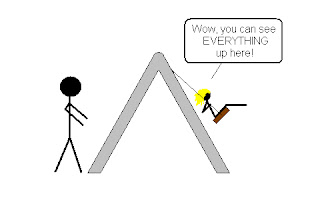I was asked to give a talk during my Sunday services this past weekend, explaining what I got out of the Lamb of God
production I participated in a few months back. Due to nerves or lack of preparation or whatever, I don't know how well I actually communicated my point. So I'ma get a little personal and religious here. I wound up speaking on something I'm pretty passionate about, so I hope you'll permit me to share my thoughts here.
And, if not... well, it's my
name at the top of the blog, after all.
I participated with several other members of our stake in performing Rob Gardner’s The Lamb of God. I was one of two narrators that read the words of the gospels over the singing and the orchestration. It was a great privilege to participate in the presentation, one which prompted a great deal of thought and introspection on my part on a subject that has actually been in my mind several times over the last ten years.
While I served a mission for the Church in the Czech Republic, I, along with the other elders and sisters in our small branch in Olomouc, were assigned to perform a musical number. We selected the hymn and worked on it diligently. One of the sisters suggested that I sing a solo as part of the presentation. Being a bit of a shrinking violet, I attempted to refuse. Then Elder Aaron Coombs, a good friend of mine and a diligent missionary, shook his head at me, and, with a click of his tongue, said, “Elder Bradford, I think you’re hiding your light under a bushel.” After receiving that chastisement, I agreed to sing the solo. The number was not a failure, so my involvement scarred no one.
Elder Coombs was referring to the Savior’s Sermon on the Mount: “A city that is set on an hill cannot be hid, neither do men light a candle, and put it under a bushel, but on a candlestick; and it giveth light unto all that are in the house. Let your light so shine before men, that they may see your good works, and glorify your Father which is in heaven.” Up until that point in my life, I had thought that the “light” the Savior mentioned was one’s personal testimony. I still believe that particular interpretation of the scripture, but I have since added another. The Savior intends for us to let our talents and abilities shine before men.
Understanding that our abilities are gifts from the Lord lends added significance to the parable of the talents. “The kingdom of heaven is as a man travelling into a far country, who called his own servants, and delivered unto them his goods. And unto one he gave five talents, to another two, and to another one; to every man according to his several ability; and straightway took his journey.” Each of the man’s servants was tasked with caring for a portion of the master’s wealth. The first two servants multiplied their talents and were best. The third, who feared failure, hid his talent, and soon found that it was taken away from him.
We cannot let fear of failure or worldly judgment inhibit us in cultivating those abilities which the Lord has given us. Even if our talent is small, we can still find a way to build it into something worthwhile. Remember that the man in the parable said to his slothful servant that his single talent could have been invested and grown through interest. So too can our small talents be improved on, although we may not have as much ability as another.
All men and women are given abilities from God, although we may not always have those gifts which we desire, or those that we see in others. In the Doctrine and Covenants, we read that “all have not every gift given unto them; for there are many gifts… To some is given one, and to some is given another, that all may be profited thereby.” We often talk of spiritual gifts, such as the gift of healing or revelation; however, we are also aware that some are naturally gifted in sport or in song, or in other apparently secular skills. I believe that these worldly abilities may too be considered spiritual gifts, as they bring great joy to many. As the prophet Moroni teaches, “Every good gift cometh of Christ.”
In the introduction to his analysis of the Articles of Faith, Elder James E. Talmage wrote that the school of theology, or the study of those things relating to religion, in fact encompasses all human knowledge, and then some. He wrote that theology’s domain is that of truth. “The industrial pursuits that benefit mankind, the arts that please and refine, the sciences that enlarge and exalt the mind – these are but fragments of the great though yet uncompleted volume of truth that has come to Earth from a source of eternal and infinite supply.” While the worldly pursuits we engage in cannot compare to the majestic truths that God can reveal to us, we may rightly, I believe, treat those pursuits as part of the endless knowledge of God, especially when those pursuits invite and entice us to do good, as Moroni described.
It is not enough that we merely improve or multiply our talents. Turning to the Doctrine and Covenants again, we read: “And all this for the benefit of the church of the living God, that every man may improve upon his talent, that every man may gain other talents, yea, even an hundred fold, to be cast into the Lord’s storehouse, to become the common property of the whole church – Every man seeking the interest of his neighbor, and doing all things with an eye single to the glory of God.” Our talents are not meant merely for our edification. We are meant to serve and uplift others with the abilities with which we have been blessed.
That is what so impressed me about our stake’s performance of The Lamb of God – so many people pooled their talents to do a marvelous thing. The composer, Rob Gardner, demonstrated great musical ability, and he chose to use his talent to teach of Christ. Young Latter-day Saints, much like me, had gathered together to praise God through music. We were led by a talented and diligent conductor. The choir was filled with beautiful, eager voices. The orchestra played with great skill and emotion. I was proud to lend my talents to the presentation, even if I only showcased my ability to read.
It is our responsibility then to figure out how our talents can be used to build up the kingdom of God. Here I intend to tell you the conclusion I came to regarding my own talents. I don’t presume to say that my conclusion is right for everyone, but this idea, that our talents are to be used to build the kingdom of God, is one that I believe so strongly that I don’t know how to discuss it without referring to my personal experience. I hope that what I have to say now will be beneficial to you all and will not come across as self-righteous, egotistical, or, worst of all, boring.
I believe the Lord has blessed me with a great deal of ability; however, I doubt that much of what I can do is immediately practical. I can sing with some level of skill, I enjoy writing, and I perform every now and again with local theater troupes. For me, it wasn’t immediately evident how I could use my talents to build the kingdom of God. I haven’t the skill to compose beautiful music. I don’t write sermons very well. And my theatrical ability usually boils down to me getting slapped in the face for the entertainment of an audience. Amusing, but hardly the stuff from which the kingdom of God is built.
The conclusion I came to, and the goal around which I wish to build my life, is that my skills lend themselves to storytelling. I enjoy a good story, and I believe in the power of a story to change a person’s life for the better. My watchword comes from the admonition of Paul, as outlined in the thirteenth Article of Faith: “If there is anything virtuous, lovely, of good report or praiseworthy, we seek after these things.” Many truths about the process of repentance can be learned from novels such as Victor Hugo’s Les Miserables. Much appreciation for the beauty of creation can be felt through the poetry of writers like Robert Frost. If men like these, who did not have the privilege of Gospel knowledge to guide them, can create these life-changing works, then I can do likewise.
For me, the greatest blessing that came from participating in The Lamb of God with our stake was the reminder of the divine power of the stories in the New Testament, which confirm and strengthen my testimony of Jesus Christ. I love the story of Peter, who denied the Christ, repented, and was forgiven. I love the story of Thomas the disciple who doubted, and who was led to believe. I love the story of Mary the mother of Jesus, who mourned at the foot of the cross. Rob Gardner, the composer of The Lamb of God, took a slight liberty with Mary’s story that I feel was appropriate and would like to share. After the death of the Savior in Gardner’s production, Mary sings, not of her despair, but of her hope. “Hope did not die here, but here was given. And ours is the victory. Here is hope.”
I testify that God has given us great ability which makes us equal to the trials and tasks set before us, as long as we trust in Him. I bear testimony that Christ came to earth to teach us the way to return to our heavenly home. He spoke in parables, that those who would hear could understand. He is the master storyteller. He is the son of God.





































